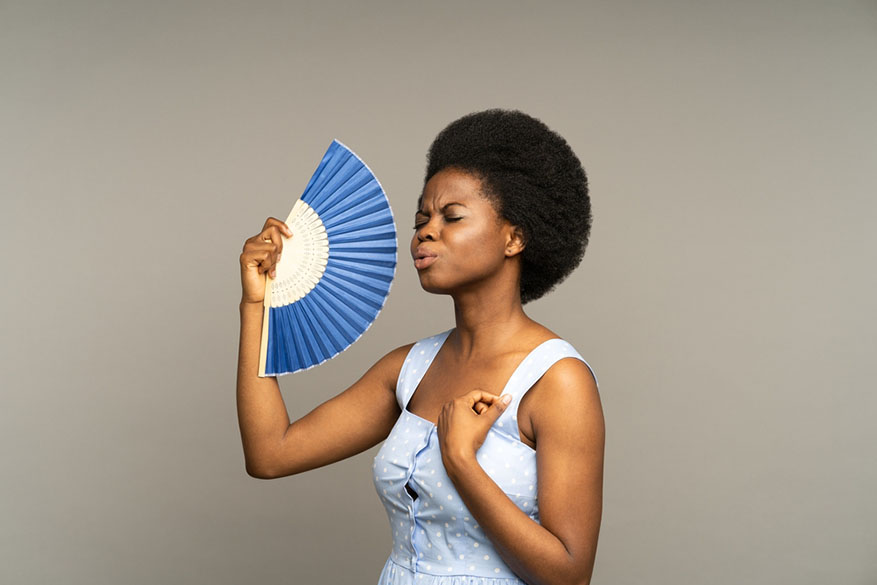
How Long Does Menopause Last?
Women going through menopause may experience several discomforting symptoms. But knowing how to beat menopause fatigue and other issues associated with this natural part of a woman's life cycle can bring relief. In addition to information, Sofia & Grace offers products to ease you through this time. Continue reading and learn about perimenopause and menopause and how to manage their symptoms.

Shutterstock/ShotPrime Studio
What Is Perimenopause?
Perimenopause is the transitional stage before you actually reach menopause. Some experts refer to it as menopause transition. Women may start showing signs of perimenopause in their late 30s or 40s. Noticeable signs are:
- Irregular menstrual periods or spotting
- Hot flashes
- Problems sleeping
- Mood swings
What Is Menopause?
You are in full menopause after you have missed your menstrual cycle for 12 consecutive months. Women can no longer conceive, and the periods end permanently. At this time in life, your symptoms may include those listed above plus the following:
- Urinary incontinence
- Vaginal dryness
- Bloating
- Sexual discomfort
- Hormonal (estrogen and progesterone) imbalance
How Long Does Menopause Last?
During the transitional stage, perimenopause can range from two to 14 years. Women experience minor symptoms at different ages. Some females may start as early as 35, while the norm is usually in their 40s. Factors that can affect the onset of symptoms include lifestyle, eating habits, and surgery involving the reproductive organs, such as a hysterectomy.
If it has been one year since you had a menstrual period, you are likely in the menopausal stage. The average age range for women is between 45 and 58. During this stage, you can find relief using various menopause products for mindfulness and urinary tract health.
Find Menopause Relief Products
Relief and Solutions for Menopause Symptoms
For common menopause symptoms, you can find relief in over-the-counter and natural treatments. You and your doctor can decide which solutions are suitable for treating and relieving your issues.
Hot Flashes
Hot flashes can occur at any time. When it happens at nighttime while you are sleeping, it's often referred to as night sweats. Drink plenty of water during the day or sip on cold water if hot flashes are intense. Use your ceiling fan and dress in lightweight clothing to keep the body cool.
For night sweats, you can adjust your bedding for more comfort. Natural fibers like cotton and linen are the best for sleepwear and bed linen.

Shutterstock/DimaBerlin
Sleeping Disorders
Many women may experience insomnia during this phase of life. Try a variety of solutions to help you fall asleep at night. Make sure the room temperature is cool. You can listen to soft or relaxing music, read a novel, or meditate for relaxation. These methods can positively affect your sleep.
Menopause and Bloating
Women experiencing menopause and bloating will likely have gas and water retention. Menopause slows down your digestive system, resulting in constipation. You can reduce bloating by avoiding certain foods, such as beans, known for triggering this symptom.
Exercising promotes good digestive health and reduces constipation and bloating caused by gas. Gradually start an exercise routine comprised of walking, stretching, cycling, aerobics, and Kegel exercises. Monitor the foods you eat, including vegetables and grains, to observe the effects on your digestive system. A nutritional diet and exercise can reduce or eliminate menopause bloating.
Mood Swings
Women in the transitional stage of menopause can have mood swings. Mental effects may include anxiety and depression. Living a healthy lifestyle benefits your physical and mental health at any age.
You can start by using a variety of techniques for relaxation and reducing stress. Yoga is an exercise effective for deep breathing and posture. Exercising and balanced nutritional meals are solutions for controlling mood swings.

Shutterstock/favorita1987
Urinary Incontinence
Urinary incontinence, or UI, is common among women during perimenopause and menopause. You can try natural solutions to control the symptom. First, remove foods and drinks containing acid and caffeine. These ingredients can damage or irritate the bladder.
Drinking at least eight eight-ounce cups of water daily helps to clear the bladder and the urinary tract. Avoid eating tomatoes, grapefruit, and oranges. And stop drinking coffee and soft drinks containing caffeine. Use Kegel to help strengthen the pelvic floor muscles and reduce bladder leakage.
Relieving Your Symptoms During Perimenopause and Menopause
While perimenopause may last up to 14 years for some women, women have solutions to eliminate or reduce symptoms. Visit Sofia & Grace online to learn more about menopause relief techniques and products.